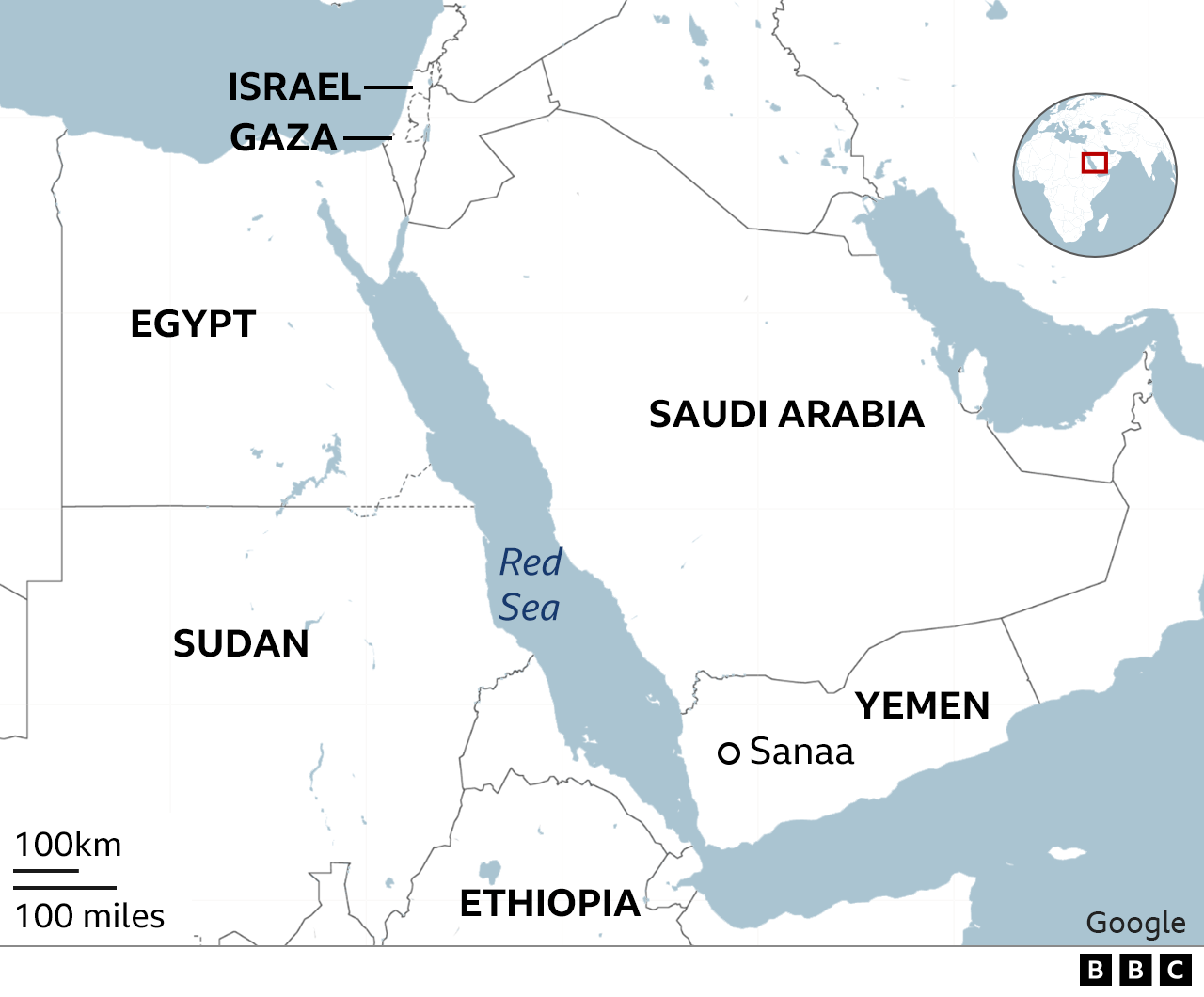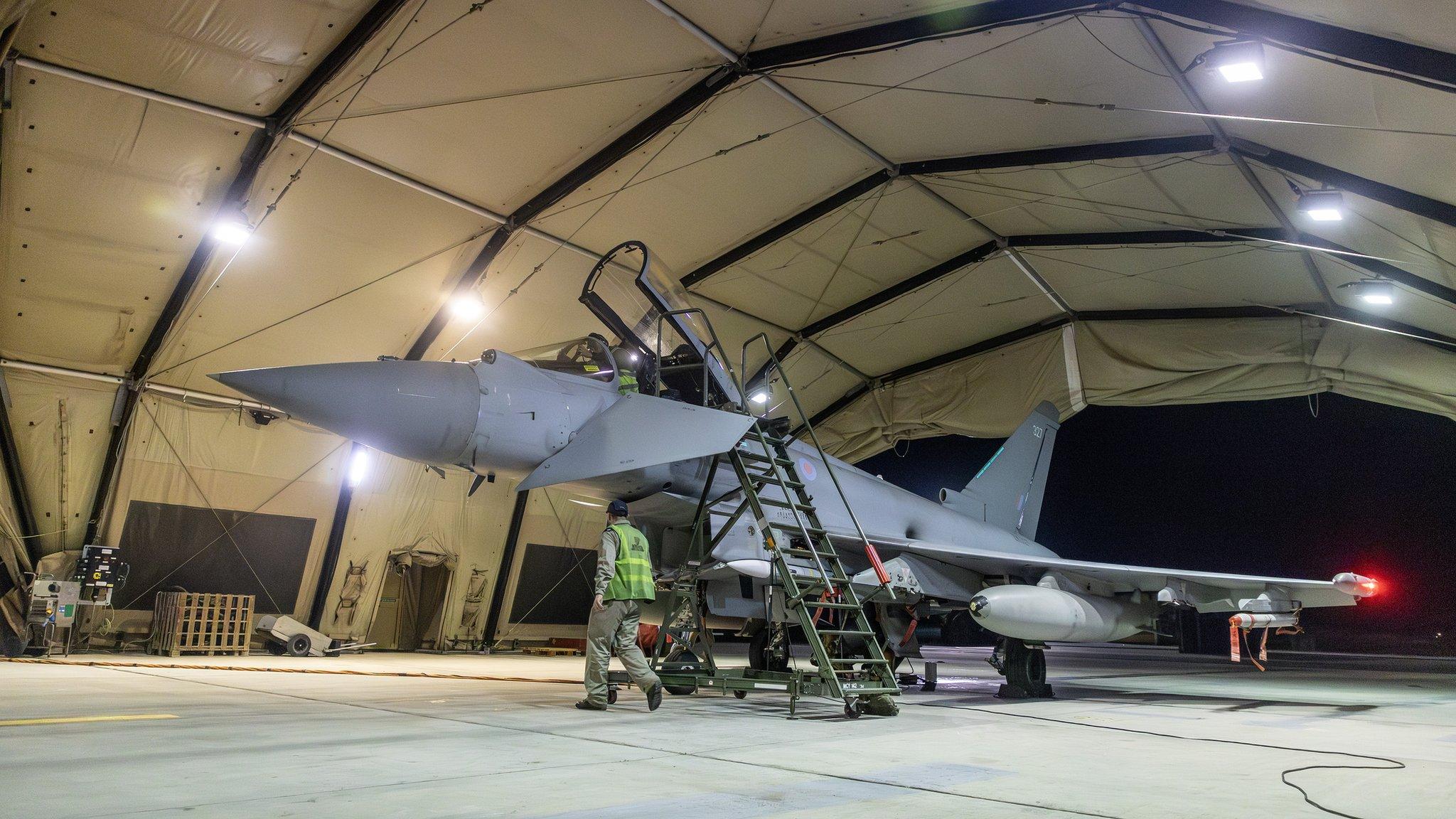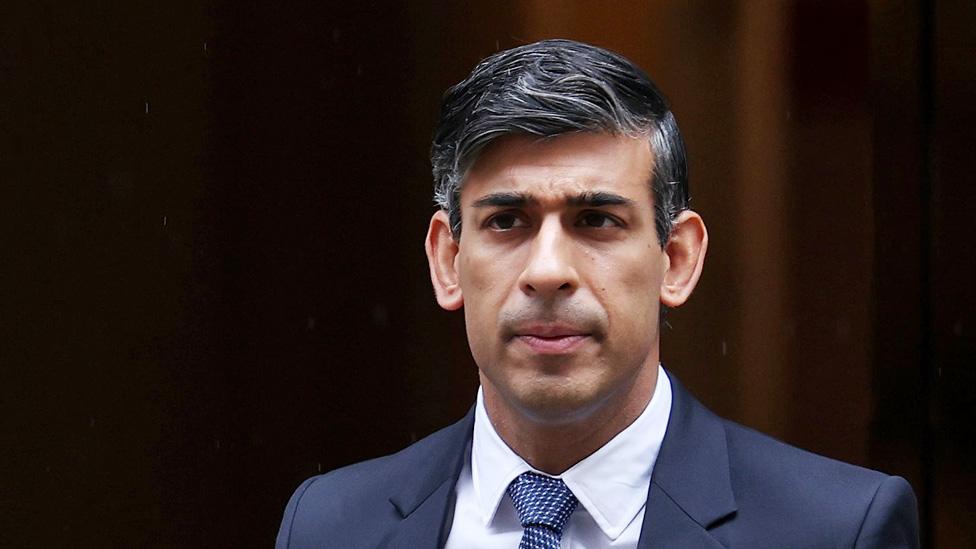Rishi Sunak faces call for MP vote on Houthi air strike
- Published
The prime minister says the UK had to send a "strong signal" to the Houthis attacking ships in the Red Sea.
Rishi Sunak is facing calls for a vote on RAF air strikes against Houthi rebel targets in Yemen, amid concerns over escalation in the Middle East.
Downing Street briefed Sir Keir Starmer and Commons' Speaker Sir Lindsay Hoyle shortly before air strikes began on Thursday evening.
Parliament had already risen for the weekend.
The Lib Dems, SNP and Plaid Cymru have urged it to be recalled to hold a vote on the military action.
Downing Street has said there are "no plans for a retrospective vote" as parliamentary approval is not required for military action.
Commons votes have been held on most armed interventions since the 2003 Iraq war, but constitutionally only the prime minister can authorise strikes.
Overnight on Thursday, a US-led air strike hit more than 70 targets at 16 locations used by the Houthi rebels in Yemen.
The Houthis say five of their members were killed and six others injured. The action was the first against the Houthi militia since it started targeting international shipping in the Red Sea last year.
The airstrike will not go without "punishment or retaliation", the group's leadership have warned.
The Houthi movement is a political and military group which controls a large part of Yemen and says it is supporting Hamas by targeting ships heading to Israel.
Where is Yemen?


Labour leader Sir Keir Starmer said his party was "fully supportive" of the military action aimed at preventing attacks on shipping in the Red Sea.
"I want the prime minister to make a statement as soon as possible, but the principle of taking action against the Houthi rebels is really important," he added.
But Labour MP and former shadow chancellor John McDonnell warned that the UK and US action could set "the region alight".
Jeremy Corbyn, the former Labour leader, described the strikes as "a reckless act of escalation" and said it "is utterly disgraceful that Parliament has not even been consulted".
Commons Speaker Sir Lindsay Hoyle said he had "made representations" to Deputy Prime Minister Oliver Dowden who gave the briefing on Thursday evening, for the Commons "to be informed at the earliest possible opportunity" about the military action.
He said he was "happy to facilitate a recall at any time".
Scotland's First Minister, and SNP leader, Humza Yousaf said there were "significant questions" to be asked and answered about military action, lending his support for the Westminster parliament to be recalled.
Lib Dem leader Sir Ed Davey says his party is "minded to approve" military action in the Yemen but he says it's a matter of principle that the government should seek the approval of parliament.
The party is demanding a recall, saying MPs should not be "by-passed".
"When it comes to military action and putting military people on the frontline, it is important that MPs take that incredibly seriously and have that debate," the party's foreign affairs spokesperson Layla Moran said.
MPs must hear the government's reasoning for the strikes and contingency plans for retaliatory measures because "this could well not be the end of it", she added.
Legal advice
The prime minister has said he will make a Commons statement on Monday - after he returns from a visit to Ukraine, but a vote is thought to be unlikely.
Asked why he had not recalled Parliament ahead of the military action, Mr Sunak argued the action taken was "limited and necessary".
He accused the Houthis of acting "with impunity", and said their behaviour needed to be responded to with a "strong signal that this breach of international law is wrong".
In an effort to reassure MPs, Mr Sunak has published a summary of the legal advice, external which underpinned the military action.
Government lawyers said the strikes were legally taken to "downgrade the Houthi's capabilities and deter further attacks".
While there is no suggestion that further action is imminent, the BBC understands if another intervention does become necessary, new legal advice will have to be sought.
Ministers have told the BBC that the timing of the strikes could not be determined by the UK government alone, as this was a US-led operation.
It is likely we will hear calls for a parliamentary vote in advance of any further action - should any be deemed necessary - when MPs meet on Monday.

The rules for parliamentary approval of UK military action
The House of Commons Library suggests, external that, on the basis of recent military operations, prior approval is now required when military action is taken. But the Institute for Government think tank points out, external the guidance is "far from clear cut".
So, what are the rules?
The prime minister can authorise military action under the Royal Prerogative, a power from the Crown instead of Parliament. But, politically the issue is less clear cut
In 2011, David Cameron's coalition government said it would observe a convention that the Commons should get the chance to debate military action - a rule they later added to the Cabinet Manual
MPs historically debated conflicts after they started. But now parliamentary support became increasingly key. During the contentious Suez crisis in 1956, Anthony Eden won a series of votes in the Commons, but faced fierce Labour opposition and international pressure, leading to a swift withdrawal and Eden's resignation.
Before the UK joined the US in invading Iraq in 2003, Tony Blair held and won a vote authorising British action, external. There had been no such votes on the invasion of Afghanistan in 2001.
Since the Iraq war, most UK military deployments have followed parliamentary approval, but some have not. In April 2018, air strikes targeted Syrian chemical weapons facilities without a Common vote. The government defended this on humanitarian grounds. Then-PM Theresa May later made a statement, but there was no retrospective vote
In August 2013, MPs rejected British intervention in Syria's civil war, to deter President Assad from using chemical weapons. David Cameron became the first prime minister since Lord North in 1782, during the American War of Independence, to lose a parliamentary vote on military action. No UK action took place.
Additional reporting: Chas Geiger
Related topics
- Published12 January 2024

- Published12 January 2024
